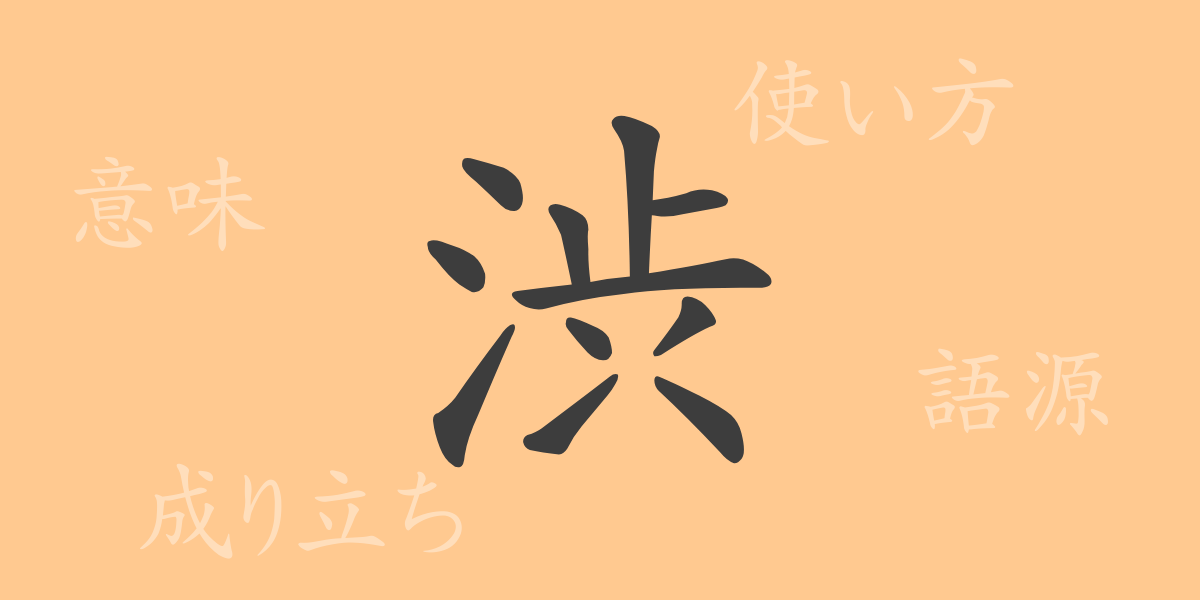The beauty of the Japanese language lies in its rich expressions. Particularly, the depth of meaning contained in a single kanji character symbolizes the subtlety of Japanese culture. This time, we focus on the kanji “渋(しぶ, shibu),” which is cherished as a commonly used kanji in Japan. Not only is “渋(しぶ, shibu)” visually striking, but its etymology and usage also resonate deeply with the Japanese spirit. Let’s explore the profound world of the kanji “渋(しぶ, shibu)” through this article.
渋(しぶ, shibu)の成り立ち(語源)
The kanji “渋(しぶ, shibu)” originates from ancient China, combining the character for trees by the water “木(き, ki)” and flowing water “水(みず, mizu).” Originally, it depicted trees growing robustly by the water’s edge. Over time, it came to represent the astringency of fruit, giving rise to the expression “渋い(しぶい, shibui).” Thus, “渋(しぶ, shibu)” describes both the natural scene and human perception.
渋(しぶ, shibu)の意味と用法
“渋(しぶ, shibu)” has multiple meanings. The most common use is to describe the astringent taste of fruit. However, it also conveys much more. “渋い(しぶい, shibui)” can describe a subdued color, a refined atmosphere, or a stylish appearance. Additionally, in negotiations, when someone is reluctant to give in, the term “渋る(しぶる, shiburu)” is used. These uses reflect the unique sensibilities of the Japanese language.
渋(しぶ, shibu)の読み方・画数・部首
The kanji “渋(しぶ, shibu)” also garners attention for its readings and structure.
- 読み方: 音読みで「ジュウ(じゅう, jū)」、訓読みで「しぶい(しぶい, shibui)」「しぶる(しぶる, shiburu)」「しぶ(しぶ, shibu)」
- 画数: 11画
- 部首: 水(みず、さんずい, mizu, sanzui)
渋(しぶ, shibu)を使った熟語・慣用句・ことわざとその意味
There are numerous idioms and phrases containing “渋(しぶ, shibu),” each illustrating the depth of the Japanese language. For example, “渋い顔(しぶいかお, shibui kao)” refers to a displeased or stern expression, and “渋滞(じゅうたい, jūtai)” means traffic congestion. The idiom “渋い顔をする(しぶいかおをする, shibui kao o suru)” indicates reluctance. These terms are used in everyday conversations, literature, and business contexts.
渋(しぶ, shibu)についてのまとめ
The kanji “渋(しぶ, shibu)” possesses a diverse range of meanings and uses beyond its surface appearance. From describing a taste to expressing human emotions and traffic conditions, “渋(しぶ, shibu)” exemplifies the richness of Japanese expression. Through this article, we hope to convey the allure of “渋(しぶ, shibu)” to our readers. Let’s continue to learn the depth of the Japanese language, one kanji at a time.

























